Which information obtained by the nurse about a patient who has been taking prednisone 40 mg daily for 3 weeks is most important to report to the health care provider?
Patient stopped taking the medication 2 days ago.
Patient's blood pressure is 148/94 mm Hg.
Patient has bilateral 2+ pitting ankle edema.
Patient has not been taking the prescribed vitamin D.
The Correct Answer is B
Prednisone is a corticosteroid medication that can cause a range of side effects, including fluid retention, electrolyte imbalance, and increased blood pressure. A blood pressure reading of 148/94 mm Hg indicates hypertension, which may be related to the use of prednisone. It is essential to report this finding to the health care provider as it may require further evaluation and management, such as adjusting the medication dosage or initiating additional treatments to control blood pressure. The other information provided, such as stopping the medication, ankle edema, and not taking prescribed vitamin D, is relevant but does not pose an immediate threat to the patient's health compared to uncontrolled hypertension.

Nursing Test Bank
Naxlex Comprehensive Predictor Exams
Related Questions
Correct Answer is C
Explanation
Prednisone is a corticosteroid medication that can increase blood glucose levels by promoting gluconeogenesis (the production of glucose from non-carbohydrate sources) and reducing glucose utilization in the body. This can lead to elevated blood sugar levels, especially in individuals with diabetes. The client's history of urinary tract infection and the use of Prednisone suggest that the infection might have triggered the development of DKA.
It's important to note that DKA can occur even when a person is taking insulin as prescribed and following their diet carefully if other factors contribute to the development of DKA, such as an underlying infection or the use of certain medications like Prednisone. The nurse should further assess the client's condition and notify the healthcare provider to initiate appropriate management for DKA.
Correct Answer is B
Explanation
A blood glucose level of 40 mg/dL indicates severe hypoglycemia, which is a medical emergency requiring immediate attention. Hypoglycemia can lead to confusion, altered mental status, seizures, and loss of consciousness if not treated promptly. Therefore, it is crucial to assess and intervene quickly to raise the patient's blood glucose level to a safe range.
While the other clients mentioned also require attention and appropriate care, the severity and immediate risk associated with severe hypoglycemia make it the priority situation. The nurse should initiate appropriate treatment for hypoglycemia, such as administering glucose or glucagon, and closely monitor the patient's response.
Whether you are a student looking to ace your exams or a practicing nurse seeking to enhance your expertise , our nursing education contents will empower you with the confidence and competence to make a difference in the lives of patients and become a respected leader in the healthcare field.
Visit Naxlex, invest in your future and unlock endless possibilities with our unparalleled nursing education contents today
Report Wrong Answer on the Current Question
Do you disagree with the answer? If yes, what is your expected answer? Explain.
Kindly be descriptive with the issue you are facing.
